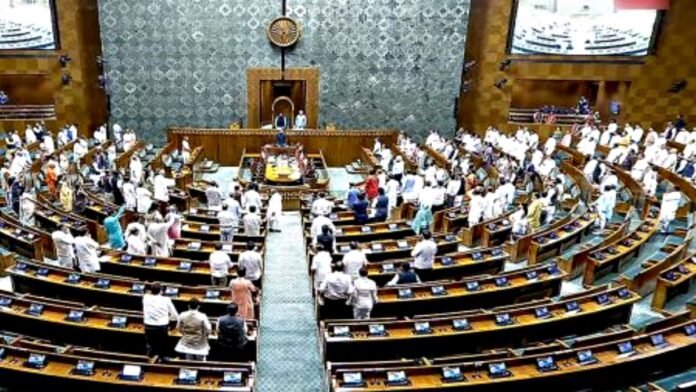
Key Points:
- The Waqf (Amendment) Bill 2025 aims to improve the administration of Waqf properties while addressing loopholes in the 1995 Act.
- Opposition parties claim the bill undermines minority rights and violates constitutional provisions.
- Union Ministers Amit Shah and Kiren Rijiju defend the bill, emphasizing transparency and fairness in Waqf governance.
New Delhi: The Lok Sabha witnessed fiery debates on Wednesday as Union Minority Affairs Minister Kiren Rijiju introduced the Waqf (Amendment) Bill 2025, aimed at reforming the management of Waqf properties in India. The bill, which proposes sweeping changes to the Waqf Act of 1995, has sparked strong opposition from parties within the INDIA bloc, including Congress, TMC, and AIMIM, who argue that it infringes upon minority rights.
What Is the Waqf Amendment Bill?
The Waqf (Amendment) Bill seeks to address longstanding issues in regulating Waqf properties, which are lands dedicated for religious or charitable purposes under Islamic law. India has over 8.7 lakh Waqf properties spanning 9.4 lakh acres, making it the third-largest landholder after the Armed Forces and Indian Railways.
Key changes proposed include:
- Eliminating ‘Waqf by user’: Land cannot be considered Waqf property simply because it has been used as such over time; only officially endowed properties will qualify.
- Government oversight: Properties mistakenly recorded as Waqf will cease to be so, with disputes handled under state revenue laws rather than by Waqf Boards.
- Representation: Introducing non-Muslim members and ensuring two Muslim women are included in Waqf Boards.
- Digital reforms: Mandating unified digital records for transparency and efficiency.
The bill also renames the act to Unified Waqf Management, Empowerment, Efficiency, and Development Act (UMEED).
Government’s Defense of the Bill
Union Home Minister Amit Shah defended the bill, stating that it incorporates recommendations from a Joint Parliamentary Committee (JPC) that reviewed over 97 lakh submissions and consulted 284 delegations across 25 states and union territories. Shah emphasized that the amendments aim to rectify legal ambiguities created by previous governments.
Kiren Rijiju further clarified that no land would be taken under this bill and dismissed rumors about interference in religious institutions. He highlighted cases where government buildings were erroneously claimed as Waqf properties, including the Parliament building itself.
Rijiju stated: “The changes made by the UPA government gave overriding powers to Waqf Boards over other laws. These amendments restore balance.”
Opposition’s Concerns
Opposition leaders have vocally criticized the bill:
- TMC MP Kalyan Banerjee: Called it unconstitutional and a violation of Muslim rights, demanding its withdrawal.
- Congress MP Gaurav Gogoi: Accused the government of undermining minority communities’ contributions to India’s independence.
- AIMIM Chief Asaduddin Owaisi: Argued that the bill weakens Waqf governance and violates Articles 15 and 30 of the Constitution.
Opposition parties also raised concerns about government interference in religious affairs and questioned why amendments were rushed without adequate consultation.
Numbers Favor NDA
Despite opposition protests, NDA appears poised to pass the bill with ease. With 295 MPs supporting it against INDIA bloc’s 234 votes, NDA holds a comfortable majority in Lok Sabha.
Impact of Changes
The reforms aim to:
- Streamline governance through technology-driven processes.
- Resolve disputes over property ownership more efficiently.
- Ensure inclusivity with representation from diverse communities.
However, critics argue that these changes could dilute minority autonomy over religious assets.
The Waqf Amendment Bill 2025 has ignited a fierce debate on governance versus minority rights. While the government defends it as a step toward transparency and fairness, opposition parties view it as an attack on constitutional protections for minorities. As discussions continue in Parliament, this legislation is set to shape the future of Waqf property management in India.








































